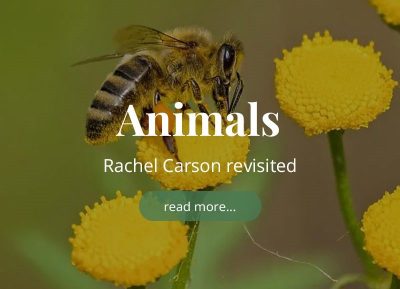The Birds & The Bees

The first introduction to ecological thinking for many people was The Silent Spring by Rachel Carson. It is one of the many books on our students recommendation reading list. Rachel Carsons heartfelt observations of the damage done to nature by human activity took America and then the world by storm. Her observations were a warning shot about the dangers of chemicals on biological life.
Carson’s simple observation was that it seemed that birds were dying off for some reason. That reason was the use of pesticides developed during World War Two being used for pest control without any study of their effect on animal or human life. Their use, especially DDT was tragic.
While killing the insects being targeted, they also killed the birds and other creatures that ate the insects. This created a cascade of environmental damage and the public was outraged. Carson became a hero to many. The book received a great reception. She was given many awards. The chemical industry tried its best to undermine her, even accusing her of being a communist.
What Have We Learned? Not Much
As we move into the sixth mass extinction the loss of mammal species get the most attention, but it is the insects that are far more important. Insects are essential for all ecosystems. They are pollinators and recycle nutrients both above and below ground. They are also a major food source for birds, reptiles, amphibians, and fish. When insects are eaten by these animals they die out and plant life suffers from lack of pollinators. It seems that we don’t really care.
In spite of all the warnings and praise for the Silent Spring, it is now over 60 years and the same problem exists. It is worse now and for the very same reasons. The total mass of insects is falling by a precipitous 2.5% a year, according to the best data available, suggesting they could vanish within a century. In 10 years, you will have a quarter less, in 50 years only half left and in 100 years you will have none.
The new analysis selected the 73 best studies done to date to assess the insect decline. Butterflies and moths are among the worst hit. The number of widespread butterfly species fell by 58% on farmed land in England between 2000 and 2009. The UK had the biggest insect falls recorded, being more intensely studied than most places.
We Are Killing Our Own Life Force
Bees have also been seriously affected, with only half of the bumblebee species in the state of Oklahoma found in 1949 still present in 2013. This same loss was found in honeybee colonies all over the United States.
The main cause of the decline in insects is agricultural intensification. If you eliminate all the trees and shrubs that border the fields you are left with no natural habitat. That means the elimination of all trees and shrubs that normally surround the fields. Habitat loss with swaths of bare fields treated with synthetic fertilisers and pesticides are a death sentence for insect life.
The cause of this insect loss and its effects on other animal life is the same as observed in Silent Spring. We seem determined to spray toxic chemicals to produce more profit from our farmland at the cost of destroying all non-human life forms. Kurt Vonnegut wrote that we might be the first creature to decide that staying alive was not cost effective. How true.
What You Can Do
One of the most effective actions we can take to reduce toxic poison in the food chain is to stop buying products that are using them in their growing or manufacture. To the best of our ability, buy organically grown vegetables. If not available where you live keep asking and try to support local small farmers. The same is true with any product you need to buy, check your ingredients list and avoid those with multiple chemical items in the recipe.
Do Not Use Dangerous Sprays In Your Garden
Glyphosate is rarely used on its own, but as part of a chemical cocktail, for instance with the trade name Roundup or Weedol.
These formulations are potentially far more dangerous. Dr Robin Mesnage of Kings College London, writes "We know Roundup, the commercial name of glyphosate-based herbicides, contains many other chemicals, which when mixed together are 1,000 times more toxic than glyphosate on its own." Recent research has shown these other chemicals include arsenic, chromium, cobalt, lead and nickel.
Glyphosate is marketed as Roundup and is a popular herbicide for home gardens. It has been classified as a carcinogenic chemical that causes damage to the liver and kidneys. It is sold as a safe chemical but is known to poision worms and other organisms in the soil as well as animals eating sprayed plants.
Helping to preserve the environment and insect life means allowing your garden to encourage biodiversity. Encourage birds to visit your garden, they are great for natural control of aphids. Avoid the use of toxic powders, pellets, and sprays, especially those containing methaldehyde. If weeds are annoying to you then simply make a spray at home to use. A highly effective weed killer made in your kitchen by using white vinegar, salt, and washing up liquid. Both vinegar and salt are rich in acetic acid, which dries out and destroys weeds. Our planet is very fragile, please tread carefully. Check out our friends work over at https://veganorganic.net for some great content.
In good health


